Presidential election campaigns in the United States are typically not about foreign policy issues – until they are. Yet, the ongoing war against ISIL in Syria and Iraq and the terrorist attacks in Paris and San Bernardino last year have made national security the most important topic for voters.
The Republican and Democratic candidates have weighed in many times, displaying fundamental differences and foreign policy approaches.
After losing the White House seven years ago, the Republicans are eager to roll back the Obama accomplishments and initiatives. Their standard positions are: opposition to the Iran nuclear deal, strong support for Israel, keeping the US prison at Guantanamo Bay, standing up to Vladimir Putin and being wary of the Chinese, as well as the rejection of Obama’s international climate and trade deals.
The Democrats, on the other hand, have expressed their determination to carry on the Obama torch and build on the outgoing president’s policies – with some notable nuances, though.
Following are summaries of the foreign policy positions of the major candidates from both parties (in alphabetical order):
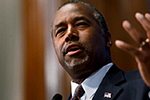 Dr. Ben Carson (Republican): Ben Carson does not have a detailed foreign policy platform, but a clear worldview inspired by his Christian faith and the Bible: the evangelical precept that the greatest danger facing America is a moral and spiritual decline at home – a decline he often compares to the Roman Empire collapsing under the weight of its own perfidy and corruption.
Dr. Ben Carson (Republican): Ben Carson does not have a detailed foreign policy platform, but a clear worldview inspired by his Christian faith and the Bible: the evangelical precept that the greatest danger facing America is a moral and spiritual decline at home – a decline he often compares to the Roman Empire collapsing under the weight of its own perfidy and corruption.
His foreign policy positions project strength and defend America’s Judeo-Christian heritage. “As a nation, we must decide definitely whether we believe in God and godly principles,” Carson once wrote, espousing a strong link between Christian faith and US politics.
Carson, a retired neurosurgeon who has never held public office, is a member of the Seventh-day Adventist Church. He has a strong aversion to Islam and has said a Muslim should not be allowed to serve as US President.
He is generally lacking foreign policy expertise and has been mocked for several gaffes he committed on the campaign trail. For instance, he said that the Egyptian pyramids were built for grain storage, he advocated that the Baltic states should join NATO (they already are) and he pronounced the radical Islamist group Hamas like “hummus”, a spread made of ground chickpeas.
Yet, the fight against ISIL has become the centerpiece of Carson’s foreign policy agenda. He is willing to send US combat troops to fight the jihadists on the ground, a more aggressive posture than most other Republican candidates.
By advocating the annihilation of the radical group, Carson argues that America should use brutal, overwhelming force to bring a quick end to conflicts, thus saving more lives in the long run, and he bemoans that “political correctness dictates we cannot kill innocent women and children in the process of destroying the enemy.”
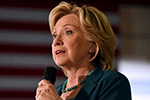 Hillary Clinton (Democrat): Hillary Clinton claims to be President Obama’s heir apparent – not surprisingly: she was his secretary of state in the first term and oversaw the administration’s foreign policy initiatives. She advocates the use of “smart power” in the pursuit of US foreign policy objectives, which she says means “choosing the right combination of tools – diplomatic, economic, military, political, legal, and cultural – for each situation.”
Hillary Clinton (Democrat): Hillary Clinton claims to be President Obama’s heir apparent – not surprisingly: she was his secretary of state in the first term and oversaw the administration’s foreign policy initiatives. She advocates the use of “smart power” in the pursuit of US foreign policy objectives, which she says means “choosing the right combination of tools – diplomatic, economic, military, political, legal, and cultural – for each situation.”
Clinton was the leading architect of the Obama administration’s strategic rebalance to Asia as well as the so-called “reset” in US relations with Russia.
She also supported the multinational deal with Iran to stop its nuclear program but said the United States must ensure that Tehran complies. “My approach will be distrust and verify. We should anticipate that Iran will test the next President. They’ll want to see how far they can bend the rules. That won’t work if I’m in the White House,” she said in September 2015.
As president, Clinton says she would penalize Iran for any violation of the agreement and reintroduce sanctions unilaterally, if necessary. In the event Iran attempts to acquire a nuclear weapon, she “will not hesitate to take military action,” she said.
As secretary of state, Hillary Clinton advocated a counterterrorism approach that leveraged the work of many federal agencies. In December 2015, she put forth a multipronged plan to defend the US homeland from terrorist attacks.
Among other things, she called on government agencies to work with top tech companies to shut down the online presence of violent extremist groups like ISIL.
She also called for greater screening of certain migrants coming to the United States, particularly those who have traveled to a country with “serious problems with terrorism and foreign fighters” in the past five years.
On China, Clinton – unlike Republican candidates – says that the next administration must continue to cultivate trust and cooperate with Beijing on a range of international challenges, like North Korea and climate change, while keeping competition within acceptable limits.
The US-China relationship is not one that “fits neatly into categories like friend or rival,” she wrote in her 2014 memoir Hard Choices. In 2015, she criticized China for “trying to hack into everything that doesn’t move in America,” and called on the United States to remain vigilant.
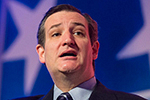 Ted Cruz (Republican): The first-term US senator from Texas has campaigned on limited government, personal freedom, and Christian conservatism.
Ted Cruz (Republican): The first-term US senator from Texas has campaigned on limited government, personal freedom, and Christian conservatism.
On foreign policy, Cruz is less interventionist than most of his Republican rivals, but he generally favors an expansion of the US national security apparatus, however in certain cases he has expressed concerns about government impinging on Constitutional rights.
In 2015, Cruz cosponsored the USA Freedom Act, a bill that placed limits on the collection of telecommunication metadata of US citizens. Cruz saw the National Security Agency’s mass surveillance activities in the United States as an example of government overreach.
Cruz has been highly critical of the Obama administration’s management of crises in the Middle East, including the Syrian civil war and the rise of the self-proclaimed Islamic State.
In a December speech, Cruz advocated ramping up the US bombing campaign in Iraq and Syria, where ISIL maintains a stronghold. But he stopped short of pushing for US combat troops to put boots on the ground.
The son of a Cuban immigrant, Cruz has denounced the normalization of US-Cuba ties, calling it a “tragic mistake,” and writing, “President Obama’s approach gives the Castros exactly what they want – economic relief and legitimacy on the international stage.”
Cruz supports free trade but has opposed elements of the Obama administration’s trade agenda. He initially voted to give Obama special authority to negotiate major trade deals like the Trans-Pacific Partnership, but he later withdrew his support because he thought Republican congressional leaders had made a “backroom” deal to allow the reauthorization of the Export-Import Bank, a federally backed lending agency Cruz strongly opposes.
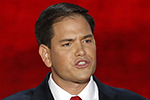 Marco Rubio (Republican): The Florida senator believes he would have an important advantage over his Republican rivals: “The next president needs to be someone that has a clear view of what’s happening in the world, a clear strategic vision of America’s role in it and a clear practical plan for how to engage America in global affairs,” Rubio said.
Marco Rubio (Republican): The Florida senator believes he would have an important advantage over his Republican rivals: “The next president needs to be someone that has a clear view of what’s happening in the world, a clear strategic vision of America’s role in it and a clear practical plan for how to engage America in global affairs,” Rubio said.
Rubio is a foreign policy hardliner who advocates more military power in the fight against ISIL, although he offered little details as of what he would do differently than President Obama.
Yet, Rubio has vehemently rejected Obama’s initiatives to engage with countries like China and Vietnam, as long they remain Communist one-party regimes.
“China steals our military and commercial secrets, obviously actively conducts cyber-operations against the United States. And, internally, their people have no religious, no freedoms, no freedom of speech, no unfettered access to the Internet,” Rubio said.
For the same reasons, Rubio is against the diplomatic opening to Cuba, one of Obama’s landmark achievements. The senator, who is of Cuban origin, has vowed to block the confirmation of a US ambassador to Cuba in the Senate.
Rubio is also against accommodating Moscow in any form. (He has called the Kremlin “a government of liars”.) Instead, he has advocated tougher sanctions against “Putin and his cronies” for the Russian aggression against Ukraine and he is favor of stronger military assistance for Ukraine.
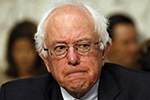 Bernie Sanders (Democrat): The Vermont senator and self-described democratic socialist, who previously served in the House of Representatives, has focused on domestic issues and wealth and income inequality and talks little about foreign policy. He backed Obama on most issues (Iran, climate change, Cuba), but also voiced important differences on defense, China and trade.
Bernie Sanders (Democrat): The Vermont senator and self-described democratic socialist, who previously served in the House of Representatives, has focused on domestic issues and wealth and income inequality and talks little about foreign policy. He backed Obama on most issues (Iran, climate change, Cuba), but also voiced important differences on defense, China and trade.
Sanders opposes increases in defense spending, particularly if they come at the cost of cuts to social programs, and he also argues against unilateral use of US military power.
Sanders, who opposed both wars in Iraq but has backed military intervention in the Balkans and in Afghanistan after 9/11, has said that the Pentagon’s spending has avoided scrutiny for decades, with many weapons programs saddled with cost overruns.
He also said that several US weapons designed to deter the Soviet Union during the Cold War should be scaled back, including the country’s nuclear arsenal.
Sanders opposes international trade treaties in general and trade with China in particular because he says it has led to job losses in the United States and the weakening of labor unions. “If elected president, I will radically transform trade policies,” Sanders said.
He is also strongly opposed to the Trans-Pacific Partnership, which he says will depress wages and pollute the environment like most other free trade agreements.
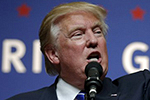 Donald Trump (Republican): Part of the reason why the front runner of the Republican race is so appealing to the conservative base is that he is an outsider with a “blustering, appalling ignorance of policy”, as Michael Gerson wrote in the Washington Post.
Donald Trump (Republican): Part of the reason why the front runner of the Republican race is so appealing to the conservative base is that he is an outsider with a “blustering, appalling ignorance of policy”, as Michael Gerson wrote in the Washington Post.
This is especially true regarding Trump’s foreign policy positions – as far as he has articulated them.
Trump has an overly simplistic, yet consistent, world view that is summed up by his campaign slogan: “Make America great again”.
He feels that the US is overcommitted around the world and he is deeply unhappy with America’s alliances. Trump is particularly angry at countries like Japan and South Korea whose defense expenditures, he believes, are unjustly picked up by the United States.
In Trump’s eyes, Japan is also benefiting from a global economy that allows Tokyo to “double-screw the US.” The Japanese receive almost their entire oil from the Persian Gulf, protected by the US military, then “they give the oil to their factories so that they can knock the hell out of General Motors, Chrysler and Ford”, he said.
Trump has also mocked European countries like the United Kingdom, where a Trump travel ban was debated in Parliament, and Germany. He openly despised Angela Merkel when Time Magazine last year declared her the “Person of the Year”, a title he wanted to have for himself and should not belong to Merkel who was “ruining Germany”, he said.
The real estate mogul also likes to portray himself as a strong leader who would “bomb the shit out of” ISIL, forbid his generals to go on television, and talk tough to China and Saudi Arabia; yet, he has expressed his respect and appreciation for Vladimir Putin.
Sources: Reuter, AP, Council on Foreign Relations, Heritage Foundation











